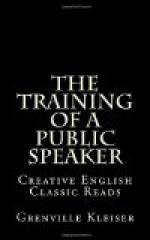ACQUIRING A PRACTICAL VOCABULARY
Yet many are seen to hesitate at single words, even while they invent, and reflect on and measure what they invent. If this were done designedly to use always the best, this unhappy temper would still be detestable, as it must check the course of speaking and extinguish the heat of thought by delay and diffidence. For the orator is wretched, and, I may say, poor, who can not patiently lose a word. But he will lose none who first has studied a good manner of speaking, and by reading well the best authors has furnished himself with a copious supply of words and made himself expert in the art of placing them. Much practise will so improve him afterward that he always will have them at hand and ready for use, the thought fitting in naturally with the proper manner of expression.
But all this requires previous study, an acquired faculty, and a rich fund of words. For solicitude in regard to inventing, judging, and comparing, should take place when we learn, and not when we speak. Otherwise they who have not sufficiently cultivated their talents for speaking will experience the fate of those who have made no provision for the future. But if a proper stock of words is already prepared, they will attend as in duty bound, not so much in the way of answering exigencies as always to seem inherent in the thought and to follow as a shadow does a body.
HOW TO CHOOSE THE RIGHT WORDS
Yet this care should not exceed its due bounds, for when words are authorized by use, are significant, elegant, and aptly placed, what more need we trouble ourselves about? But some eternally will find fault, and almost scan every syllable, who, even when they have found what is best, seek after something that is more ancient, remote, and unexpected, not understanding that the thought must suffer in a discourse, and can have nothing of value, where only the words are commendable. Let us, therefore, pay particular regard to elocution, yet, at the same time be convinced that nothing is to be done for the sake of words, they having been invented solely for the sake of things. The most proper words always will be those which are best expressive of the ideas in our mind, and which produce in the ideas of the judges the effect we desire. Such undoubtedly will make a speech both admirable and pleasing, but not so admirable as are prodigies, nor pleasing by a vicious and unseemly pleasure, but a pleasure reflecting dignity with praise.
ELEGANCE AND GRACE
The orator will recommend himself particularly by the embellishments he adopts, securing in other ways the approbation of the learned, and in this also the favor of popular applause.




